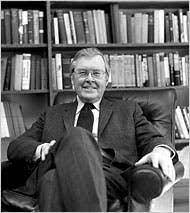Ohlin, E. Lloyd

Bio: (1918-2008) American sociologist and criminologist. Lloyd Ohlin received his doctorate from the University of Chicago, and after that, he ran research centers at the New York School of Social Work and Harvard Business School and taught at Harvard and the University of Chicago. Ohlin has dedicated his entire career to studying various areas of criminology: delinquency, juvenile gangs, prisons, crime prevention, and others.
Ohlin co-authored, with sociologist Richard Cloward, the book Delinquency and Opportunity: A Theory of the Delinquent Gang (1960), which deals with juvenile delinquents and their gangs. The authors developed the theory of "differential opportunities" to explain how the circumstances that exist in a local community, and above all the opportunities to earn illegal income, primarily affect the existence of different subcultures of delinquents. Different situations that exist in different local communities create different subcultural responses of juvenile delinquents from the poorest strata. The authors single out three typical types of juvenile gang subcultures: stable criminal subculture, conflict subculture, and withdrawal subculture. A stable criminal subculture emerges when there are conditions for crime to achieve economic mobility and the status of a serious criminal; a conflict subculture emerges in very poor neighborhoods or slums; while the withdrawal subculture brings together unsuccessful drug-addicted delinquents.
These two authors find the explanation for delinquent behavior in the inability of individuals to achieve socially propagated goals by legal means, and because they themselves accept those goals, they turn to illegal means to achieve them. On the other hand, delinquent groups or gangs enable their members to commit illegal offenses more easily, and in addition, these groups, through their own attitudes and norms, provide rationalization and justification for the delinquent behavior itself.
Fields of research
Community Conflict Crime Ghetto Mobility, Social Poverty Prisons Rationality Subculture AnomyTheoretical approaches
Chicago SchoolMain works
Delinquency and Opportunity: A Theory of Delinquent Gangs (1960);
Theoretical Studies in Social Organization of the Prison (1975);
Understanding and Controlling Crime: Toward a New Research Strategy (1986);
Human Development and Criminal Behaviour (1990).

